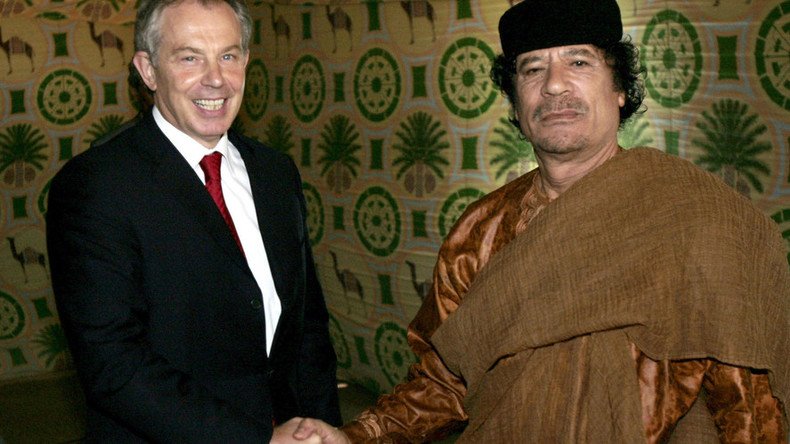Tony Blair faces MPs questions over Libya links, rendition flights

Tony Blair will be grilled by MPs on Friday about his links to former Libyan dictator Muammar Gaddafi and the impact this relationship had on British policy toward the North African state.
The former Labour prime minister’s appearance before the Commons Foreign Affairs Select Committee (FASC) is long-awaited, as his government’s policy of rapprochement with Tripoli has come under scrutiny since Libya descended into civil war.
Blair is expected to be quizzed about security collaborations with Gaddafi, including the alleged rendition of anti-government figures to Libya’s secret police.
The FASC committee is investigating Britain’s intervention in the Libyan civil war with a view to exploring future policy options.
‘Why I threw down my medals on Downing Street’: Libya war veteran speaks to RT https://t.co/VVUFbBmwylpic.twitter.com/g9IjDxWjJK
— RT UK (@RTUKnews) December 8, 2015According to FASC chairman Crispin Blunt, the current Libya policy was inherited from Blair.
“He was the one who reset Libya; it was his signal achievement, he has claimed, to disarm Colonel Gaddafi of his weapons, his WMDs.”
Blunt said Gaddafi was able to “buy himself out of the sanctions regime,” which had constrained him, and continue as “a supporter of terrorists.”
Blair’s relationship with the late Libyan dictator was highlighted in a recent biography of David Cameron, in which author Anthony Seldon asserts Blair telephoned Cameron during the Libyan war to explain he had been contacted by “a key individual close to Gaddafi.”
Cameron made a pig's ear out of Syria, Libya feels US & WH left ‘f*cked over’ - Lord Ashcroft http://t.co/OpblIARDXjpic.twitter.com/bTmB4hTSyL
— RT UK (@RTUKnews) September 22, 2015Blair allegedly told the PM’s office the Libyan dictator wanted to “cut a deal” with Britain, but Cameron did not take up the offer.
Former Foreign and Defense Secretary Sir Malcolm Rifkind said at the time he thought it was “entirely reasonable” for Blair to pass a message on from Gaddafi. It was not Britain’s place to negotiate a deal with the Libyan leader because it was an international military campaign.
Blair is also under scrutiny for his government’s alleged complicity in torture and rendition.
Documents discovered after the downfall of Gaddafi’s regime expose clandestine links between UK and Libyan intelligence officers during Blair’s premiership.
Westminster spent 13 times more bombing Libya than helping it to rebuild https://t.co/psv4Ucixl0pic.twitter.com/mzPXKnJlUC
— RT UK (@RTUKnews) July 28, 2015Among the files are MI5 accounts of Libyan exiles, an intelligence document marked “UK/Libya Eyes Only – Secret” and accounts of meetings between UK and Libyan intelligence officers, the Guardian reported.
Influential Libyan dissidents Sami al-Saadi and Abdel Hakim Belhaj claim to have been subjected to UK-Libyan rendition operations. When they returned to Tripoli they were tortured.
Blair may also be scrutinized for his business dealings with Libya.
What did Tony Blair achieve as Middle East envoy? Oliver Miles, former UK ambassador to Libya answers https://t.co/04ujGKahGt
— RT UK (@RTUKnews) May 28, 2015After the former PM left office, he is said to have made £2 million a year as a JP Morgan adviser. Blair was trying to negotiate a deal between the Libyan Investment Authority and Rusal, a Russian aluminum production company.
The deal fell through, but LIA went on to buy $300 million in Rusal shares.












